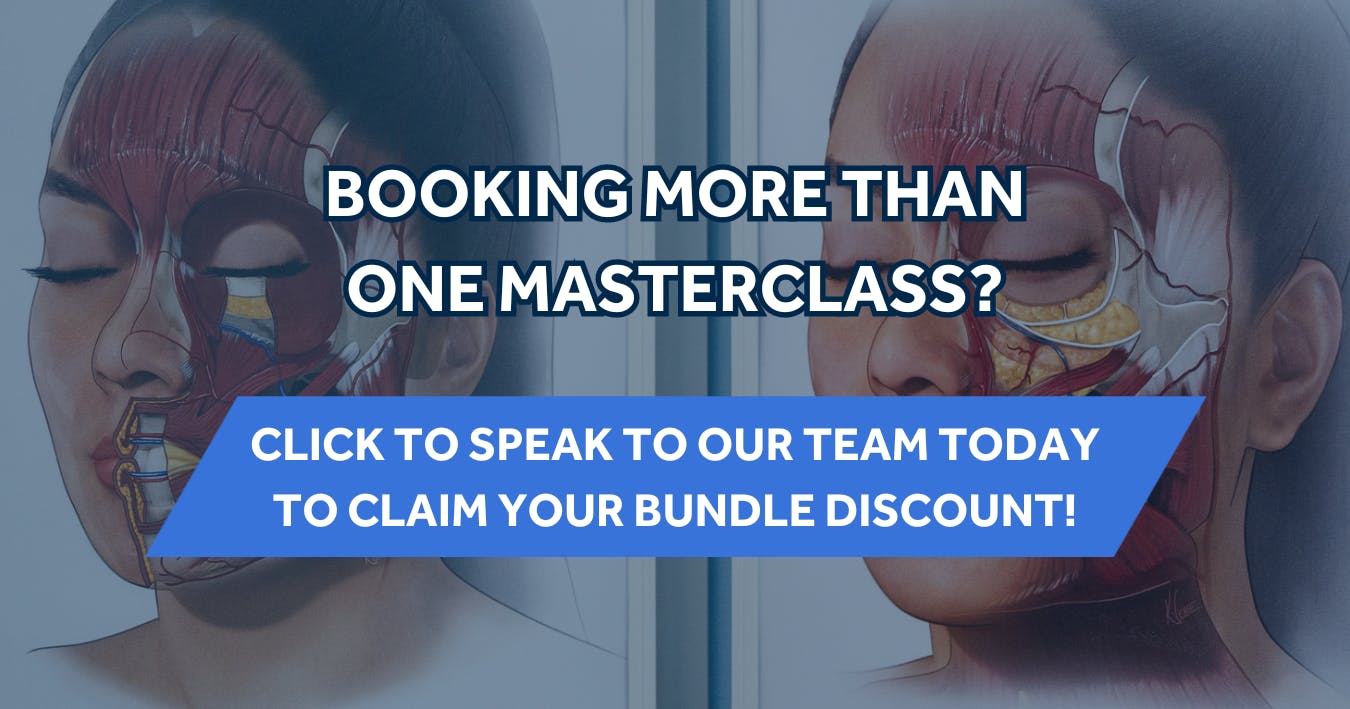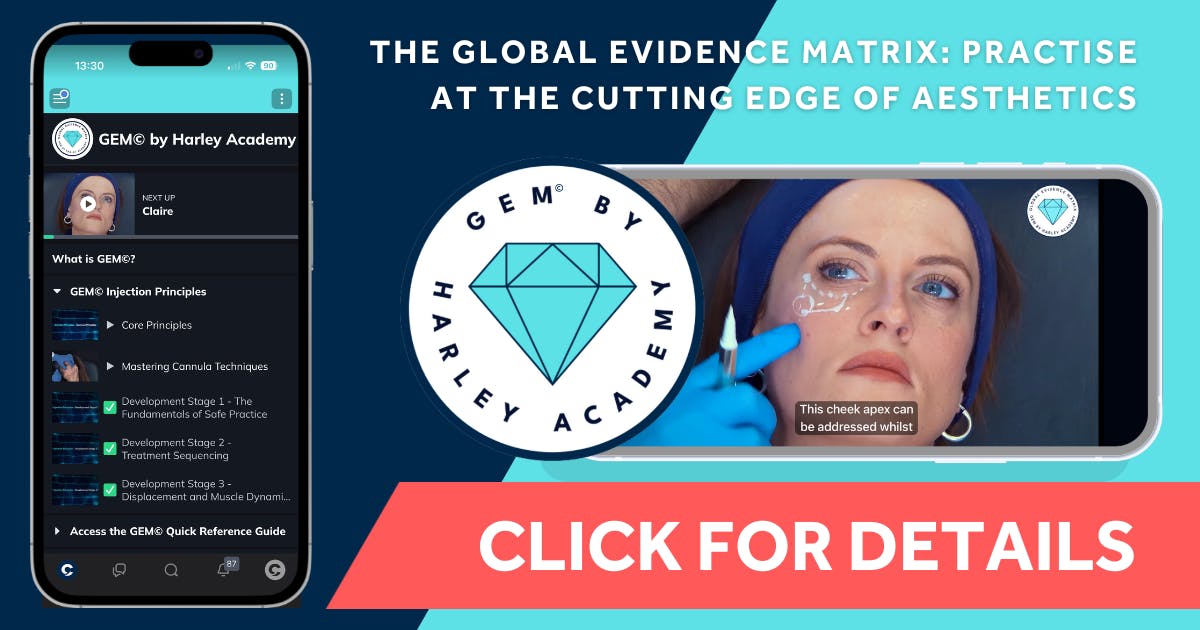How to Tell if You’re Ready to Start Practical Aesthetics Training
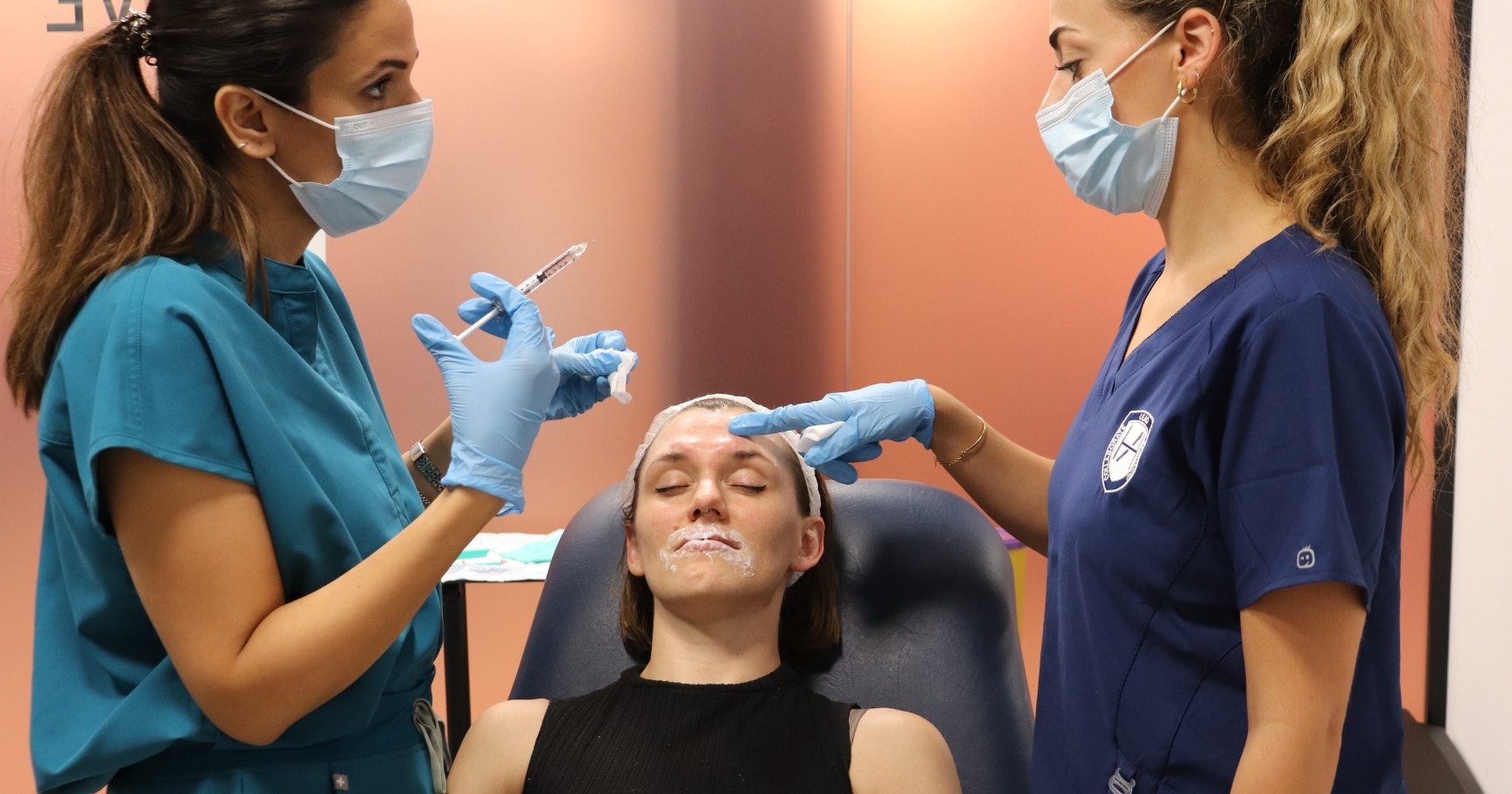
Everyone wants to get to the fun part of their aesthetics training - the injecting. But how do you know if you’re ready for the hands-on part of your botox and filler course?
Take our quiz to find out if you’re ready to start your practical mentoring sessions. This is specifically designed with our Level 7 Diploma in Cosmetic Injectables course in mind.
These questions will help you to assess your preparedness based on some of the key telltale signs. We’ll then explain how to get ready, if you’re not quite there yet…
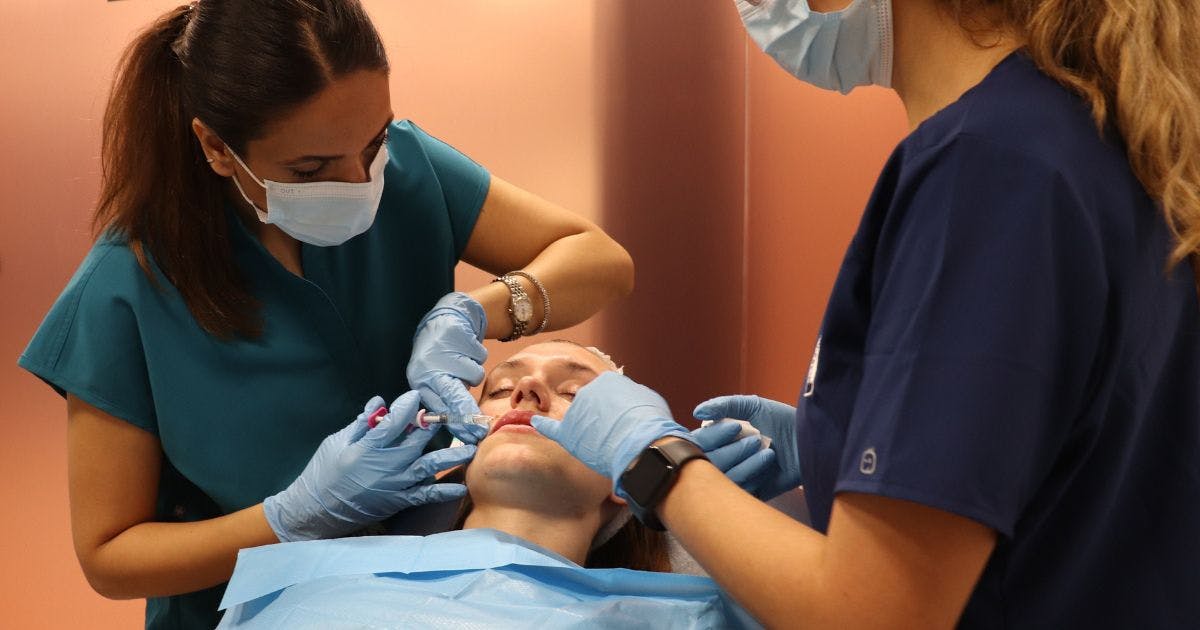
Practical Aesthetics Training Preparedness Quiz
Count how many of the following you’re able to do or understand. Score 1 point for each.
Understanding facial anatomy
- Identify key facial muscles, vessels, fat compartments, and retaining ligaments
- Understand layered anatomy, including depth and plane of injection
- Map out danger zones for both botulinum toxin and filler
- Predict how underlying structures will influence surface appearance
Pharmacology basics for aesthetic practitioners
- How botulinum toxin works at a neuromuscular level
- Onset, peak, and duration of Botox. Award yourself a bonus point for also understanding these factors for a range of different toxin brands
- Differences between high G’ and low G’ fillers, and what they’re used for
- How products behave in different planes of tissue over time.
Facial assessment 101
- Perform a structured full-face assessment
- Understand facial harmony, ageing patterns, and structural balance
- Identify what and when not to treat, including how to spot psychological red flags or unrealistic expectations
- Tailor your treatment plan to each individual face.
Basic aesthetic complications knowledge
- Understand best practice techniques to help prevent complications from filler and botox. For example, ptosis, spocking and vascular events
- Identify early signs of a vascular event.
Consent and ethical practice skills
- Can obtain voluntary, informed consent
- Understand your scope of practice and legal responsibilities
- Document treatments clearly and accurately
- Have every patient’s long-term wellbeing in mind.
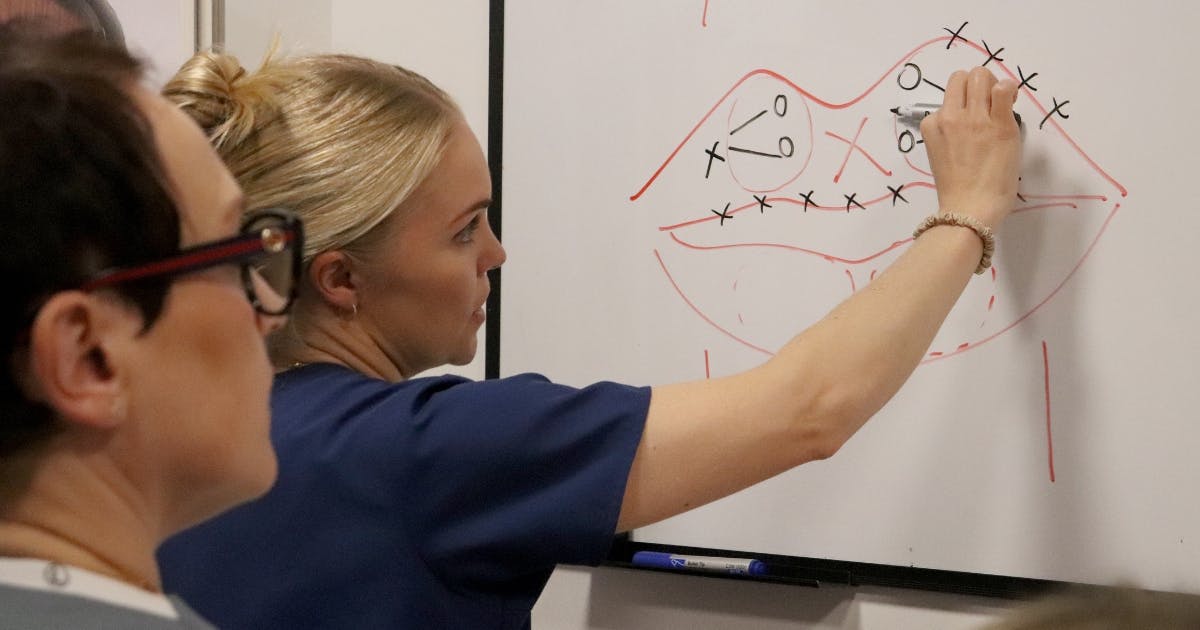
Are you ready to take your first mentoring session? Find out!
Maximum of 19 points available (18 plus one bonus point up for grabs!). If you’ve successfully completed your eLearning, you should easily score 8 or above.
If you scored 14 or more, you’re absolutely good to go! You’ve clearly immersed yourself in your eLearning and can confidently demonstrate a solid understanding of relevant theory. Crack on and enjoy your practical training!
If you scored 8 - 13, you’re fine to start your practical aesthetics training. However, we recommend brushing up on your theory just to enhance your understanding. This will allow you to get the most out of your mentoring. But please do book your sessions as you’re clearly ready to get going!
If you scored 7 or less, this indicates you need more time to get to grips with these vital aspects of aesthetic practice. We recommend you deepen your understanding of the concepts outlined in this quiz before starting your mentoring. This will allow you to get more from the experience. You are still welcome to book your mentoring sessions, but the more theory you can get under your belt beforehand, the better.
What if I’m a hands-on learner?
Whilst people learn in different ways, and some of you may be more attuned to the practical than the theoretical, there are good reasons why you should have a certain level of theory knowledge before progressing. The two main considerations are as follows.
Safety and efficacy
The practical side of aesthetic medicine is important, but it's only as safe and effective as the theory it stands on. Even under the guidance of an experienced clinical trainer, you’ll need to be able to demonstrate a basic level of knowledge. The more you know, the more confident you’ll be, which can also improve your practical training.
Get the most from your practical aesthetics training sessions
If you don’t have a good understanding of the relevant theory, you won’t get the most out of your mentoring sessions. We find that trainees who are underprepared:
- Take up more time during their sessions with basic questions which are already covered extensively in the eLearning
- Are generally less confident in their patient interactions, facial assessments and treatment planning. This is usually because there’s nervousness due to the knowledge gap
- Miss out on valuable time to build on the knowledge they should already have established.
This is absolutely not to say that you shouldn’t ask questions during your mentoring sessions. You should! We encourage this and maintain that no question is a silly question.
However, we do encourage all our trainees to understand the value and importance of learning your theory. This is the foundation of every aspect of your treatments and many common mistakes can be avoided before you even pick up a syringe.
We don’t want to discourage you from booking your mentoring sessions, we just want to ensure you get the most value out of them.
Why theory matters for aesthetic practitioners
As an aesthetic practitioner, if you don’t have the proper underlying knowledge, you’re essentially injecting blind. Good injecting starts with good decision-making. That requires trained eyes and a wealth of learned information to draw from, not just trained hands.
Becoming confident in your theory is critical for patient safety, clinical confidence, and long-term success as an aesthetic practitioner. You’ll obviously enrich and expand your expertise through hands-on practice, but there’s really no substitute for knowing your subject matter well outside of the actual injecting.
If you're eager to inject before you've built a proper foundation, take the time to reflect on why this is. Having trained thousands of aesthetic practitioners, we can tell you that the reasons generally boil down to:
- Rushing to start practising as soon as possible, often driven by a desire for either a career change or to establish an additional revenue stream
- Thinking you already know what’s needed - you’re a healthcare professional, after all. This is a classic case of overconfidence and not knowing what you don’t know
- Feeling overwhelmed by the amount of new information, so wanting to skip ahead in case the practical helps the theoretical to fall into place.
Advice from our Founder & CEO, Dr Tristan Mehta
“Before you ever touch a needle, you’re making clinical decisions,” says Dr Tristan. “What structure am I treating? What am I avoiding? What product is appropriate? What dose? What depth? What risk?
“If you're already eyeing syringe technique but can’t yet explain facial layers, name key vessels, or justify your treatment plan, you’re jumping in too soon. Practical aesthetics training may be exciting, but it’s not just about doing, it’s about thinking clinically.
“We put so much time and effort into creating the eLearning aspects of our aesthetics courses because a strong theoretical foundation opens doors. It allows you to understand facial anatomy in three dimensions and develop confident, clinical insight. You’ll be able to select products and injection planes based on scientific reasoning; interpret ageing patterns and patient concerns for more assured treatment planning.
“In short, theory gives you a framework to think like a clinician, not just act like one. Without it, even the most skilled injector is working without context. You might get lucky, but you won’t be consistent, safe, or trusted.
“Without a solid knowledge base, these decisions become guesswork, and that is not an approach we want our trainees to take. In aesthetic medicine, guesswork leads to complications, poor outcomes, and a loss of patient trust.”
Building your foundation
He continues, “Once these foundational principles are in place, your practical aesthetics training transforms this knowledge into lived experience.
“You’ll build on your theory to understand how anatomical structures feel in real tissue and how different product rheologies behave in motion. You’ll see how small changes in angle, depth, or pressure affect outcome. By communicating with real patients in real time, you’ll become more confident in your interactions, managing both expectation and emotion.
“Your mentoring sessions are where you start to own your knowledge and instead of copying techniques, you start making clinical choices.
“Think of the theory and practical aspects as two sides of clinical excellence. The better your theory, the more meaningful your hands-on experience becomes. And the more refined your practical skill, the deeper your understanding of the theory that underpins it.”
Dr Tristan concludes, “If you’re committed to becoming a great aesthetic practitioner, don’t shortcut this process. You should build it with intention through your eLearning, Observation Days, exploration of the Global Evidence Matrix, and - of course - your practical mentoring sessions.”
How to develop your theory knowledge
There are three ways we encourage you to enhance your understanding of aesthetic medicine theory.
- Fully review each stage of your eLearning and refer back to this, as necessary. Don’t skip ahead, especially if you haven’t fully understood anything
- Explore the GEM© by Harley Academy app. All our Level 7 trainees receive a free 12-month subscription, so you can use it to enhance your understanding of critical aspects of evidence-based practice. This includes accessible yet detailed information on facial anatomy, assessment, product and tool selection, injection techniques, and more. You can also filter the Global Evidence Matrix to only show you treatments aligned to your experience level, to make it more manageable
- You must complete one Observation Day before you start your practical mentoring. However, if you’ve been through the two steps above and are still feeling underprepared, booking your second session may provide you with valuable insights to bolster your comprehension and confidence
Outside of this, we highly recommend watching educational videos and demonstrations by respected clinicians and facial anatomists, to fully engage in our specialism. Join any webinars you can from reliable clinical sources, discussing key topics, especially where they’re attuned to your stage of practice.
Another tip, which we’ve received from one of our Level 7 trainees, is to invest in a facial anatomy colouring book!
What if I’m still not confident?
Please understand that nerves are normal. The majority of new trainees are nervous to some extent before starting their practical training.
A certain amount of nerves can even be useful! This apprehension can help to keep you appropriately cautious. It’s entirely understandable that a novice aesthetic practitioner would feel this way. A slight lack of confidence is also far better than being overconfident. Overestimating your abilities is setting yourself up to fail.
Remember to draw confidence from knowing that, as a medical professional, you’ll have honed many transferrable skills already. How to talk to patients, professional ethics, that gut feeling you get when something’s not right… Don’t discount these, just because you’re entering a new specialism.
If you’re still struggling with your confidence, try to work out what it is that’s making you feel this way.
Does your lack of confidence stem from anything tangible? Is there something that you haven’t quite understood that you could be better prepared for? Are you perhaps happy that you’ve taken in your necessary eLearning but are uneasy about making a mistake when treating patients? Or is it more a case of being anxious about stepping out of your comfort zone, into the somewhat unknown?
If these latter two questions resonate, rest assured these are healthy concerns to have! Your specially-trained mentor will be able to help you through these and support you at every turn.
Make a list of what your concerns are, then see how you can tackle them, following our guidance as set out here. If you’re still at a loss, reach out to our Student Support team who’ll be happy to help.
We want to help you understand how to build the right foundations so your practical training is safe, confident, and you get the most from every minute!
All information correct at time of publication
Download our full prospectus
Browse all our injectables, dermal fillers and cosmetic dermatology courses in one document
By submitting this form, you agree to receive marketing about our products, events, promotions and exclusive content. Consent is not a condition of purchase, and no purchase is necessary. Message frequency varies. View our Privacy Policy and Terms & Conditions
Attend our FREE open evening
If you're not sure which course is right for you, let us help
Join us online or in-person at our free open evening to learn more
Our Partners













STAY INFORMED
Sign up to receive industry news, careers advice, special offers and information on Harley Academy courses and services


